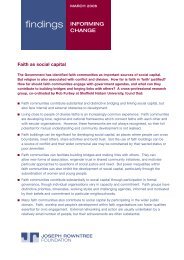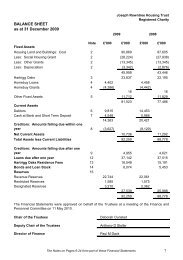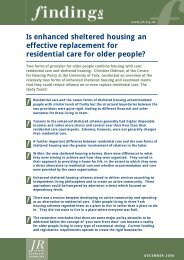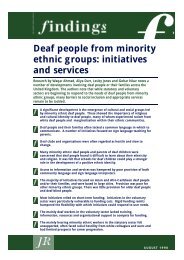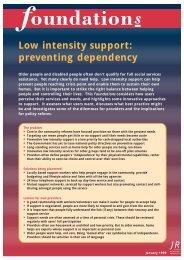Community participation - Joseph Rowntree Foundation
Community participation - Joseph Rowntree Foundation
Community participation - Joseph Rowntree Foundation
Create successful ePaper yourself
Turn your PDF publications into a flip-book with our unique Google optimized e-Paper software.
Network dynamics: explaining the pattern<br />
detect any eagerness on the part of newcomers to take on new governance roles<br />
and proceed to try to fill the gap themselves (‘Most people just don’t want to turn up<br />
to things’, said one interviewee); non-participants observe that, whenever a new role<br />
opens up, it always seems to get filled by one of the usual suspects and don’t bother<br />
putting their hat in the ring.<br />
The attitudes that underpin these expectations can actually vary considerably. For<br />
non-participants it can take the form of over-reliance (‘I don’t need to get involved<br />
because people like X will be’) or apathy (‘There’s no point in trying to get involved<br />
because people like X will already have it sewn up’). For participants it can take the<br />
form of self-aggrandisement (‘I had the skills and experience so naturally I became<br />
the secretary’) or deep frustration (‘If I don’t do it no one else will; I’m the only one<br />
trying to make sure our voice is heard’). But what is potent about the community<br />
dependency dynamic is that it still operates irrespective of which combination of<br />
these distinctive positions underpins the behaviour of participants and nonparticipants.<br />
Institutional dependency<br />
‘There is a tendency to overuse the key people’, says Tracey, explaining how<br />
institutions themselves also play a key part in fostering a culture of dependency on a<br />
small community elite. ‘As soon as you start going to one meeting or other the<br />
vultures come in.’ <strong>Community</strong> <strong>participation</strong> is often conceived by institutions as an<br />
instrumental problem of compliance rather than as a normative problem of<br />
democratic rights or a substantive problem of effective and legitimate decision<br />
making. As Taylor explains:<br />
… [institutional partners] want community participants to be<br />
representative and accountable to communities, but there is a culture of<br />
delivery about partnerships and partners want representatives to ‘deliver<br />
their communities’. 21<br />
The result is often a temptation to go for the quick fix of recruiting an existing<br />
community governor who is a known quantity and can be trusted to understand and<br />
work within the constraints of a demanding delivery environment, rather than to<br />
invest scarce time and resources in attracting new blood who will take time to settle<br />
in and may not ever develop the right kind of working relationship. ‘Once you see<br />
someone who’s half-decent you try and get them involved in other things’, says<br />
Tracey.<br />
45



